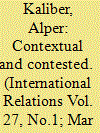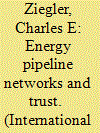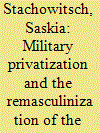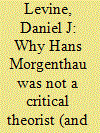|
|
|
Sort Order |
|
|
|
Items / Page
|
|
|
|
|
|
|
| Srl | Item |
| 1 |
ID:
121853


|
|
|
|
|
| Publication |
2013.
|
| Summary/Abstract |
This article introduces a novel conceptual/analytical framework to Europeanization studies. Its main aims are twofold: first, it problematizes the mainstream usage of the term Europeanization, and the notion of change that it has embraced, and second, it develops a fuller account of the impact of European integration on societies. An analytical distinction is drawn between EU-ization as a formal process of alignment with the EU's body of law and institutions, and Europeanization as a wider sociopolitical and normative context. The impact of Europeanization in a given society is heavily conditioned by the extent and the ways in which Europe is used as a context by domestic actors. To substantiate its arguments, the article focuses on the Turkish case, where Europeanization as a normative-political context has extensively been implicated in its modernization and nation-building processes as well as in recent domestic debates concerning the country's identity and future orientation.
|
|
|
|
|
|
|
|
|
|
|
|
|
|
|
|
| 2 |
ID:
121851


|
|
|
|
|
| Publication |
2013.
|
| Summary/Abstract |
Energy pipeline networks tie nations together in webs of interdependence that are mutually beneficial but which also make countries vulnerable. This article explores the relationship between political trust and energy pipelines connecting Russia and the European Union (EU). It seeks to explain low levels of trust in the EU-Russia energy relationship, varying levels of energy cooperation and trust within the EU toward Russia, and whether the EU-Russia energy relationship is representative of vulnerabilities shared by producers and consumers in other contexts. Rationalist approaches that focus on interests and reciprocity are incomplete and should be supplemented by a concept of trust based on normative factors. This article finds that political disputes with transit and consumer states, competing norms, and the legacy of mistrust from the Cold War (especially among certain East European countries) combined to form a uniquely toxic relationship.
|
|
|
|
|
|
|
|
|
|
|
|
|
|
|
|
| 3 |
ID:
121854


|
|
|
|
|
| Publication |
2013.
|
| Summary/Abstract |
This article examines the gendered implications of military privatization and argues that the outsourcing of military functions to the private sector excludes women from newly developing private military labour markets, impedes gender equality policies and reconstructs masculinist gender ideologies. This process constitutes a remasculinization of the state, in the course of which the nexus between state-sanctioned violence and masculinity is being reaffirmed. Recent research has introduced the concept of masculinity to the study of the private security sector. Building upon these approaches, the article integrates feminist theories of the state into the research field and evaluates their potential contributions to the analysis of military privatization. In an exemplary case study of the US military sector, this privatization is embedded within debates on the neo-liberal restructuring of the state and addressed as a gendered process through which the boundaries between the public and the private are being redrawn. The implications of these transformations are investigated at the levels of gender-specific labour division, gender policy and gender ideologies.
|
|
|
|
|
|
|
|
|
|
|
|
|
|
|
|
| 4 |
ID:
121852


|
|
|
|
|
| Publication |
2013.
|
| Summary/Abstract |
The European Union (EU) and the People's Republic of China (PRC) both use the terms 'multipolarity' and 'multilateralism' in their 'public diplomacy' rhetoric and in their analyses of the international system. However, while the EU stresses multilateralism, the PRC remains explicit in its welcome of multipolarity. Yet shifts are apparent. In part, there may be some 'international socialisation' in play in which EU multilateralism usage, normative underpinnings, rub off on the PRC. In part, both terms are being supplemented by still wider overlapping terms of references for an untidy multilevel international system, such as 'interpolarity', 'asymmetrical multipolarity', 'region-polarity', 'inter-regionalism', 'multilateralising multipolarity' and 'multi-multilateralism'. An untidy multilevel EU may find it easier to operate in such a shifting international system than a tidy sovereignty-sensitive PRC?
|
|
|
|
|
|
|
|
|
|
|
|
|
|
|
|
| 5 |
ID:
121855


|
|
|
|
|
| Publication |
2013.
|
| Summary/Abstract |
A growing body of critical and reflexive international relations (IR) realism draws on the work of Hans Morgenthau. While not without merit, I argue that these appropriations rely on selective - perhaps even wishful - readings of Morgenthau's work: the reflexivity that he calls for, I argue, is not matched by what his theory actually delivers. Raising that distinction, I then trace out its consequences for contemporary critical and reflexive IR realists, in two steps. First, I identify similar reflexive shortcomings in recent work by neoclassical realist Randall Schweller. These, I suggest, point to abiding challenges to which contemporary critical/reflexive realism must prove itself equal. I then survey the notions of reflexivity at work in the critical/reflexive realism of Michael C. Williams and Richard Ned Lebow. Do they go far enough? Do they answer those challenges? I conclude by arguing that Morgenthau's legacy for critical and reflexive realism should be reconsidered: properly understood, his work signals an impasse that is general to IR as a discipline. Signaling the depth of that impasse constitutes a lasting legacy, with which critical/reflexive realists have not yet dealt adequately.
|
|
|
|
|
|
|
|
|
|
|
|
|
|
|
|
|
|
|
|
|